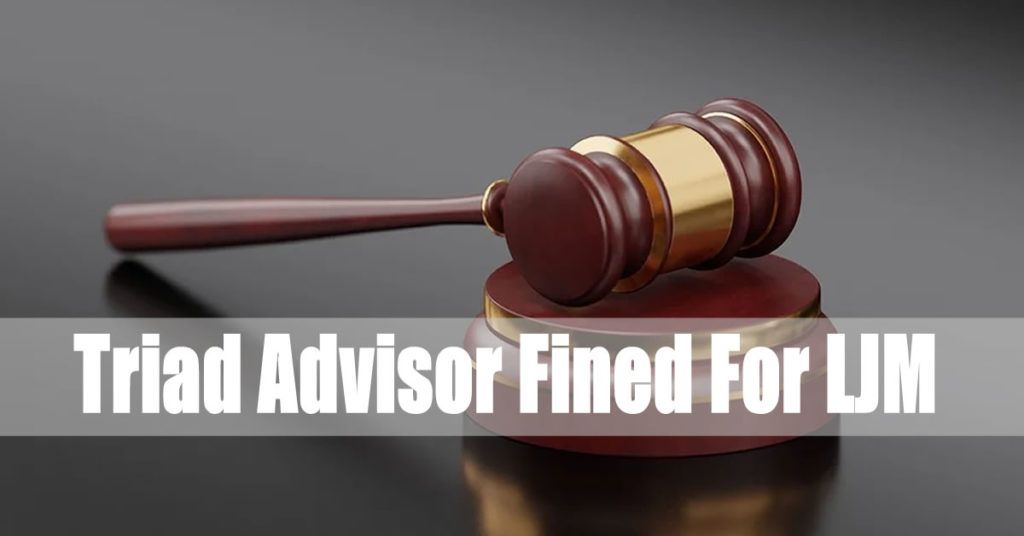Failure to supervise its registered representatives has caused the Financial Industry Regulatory Authority (FINRA) to censure and a fine of $195K for Triad Advisors. The representatives in question had recommended the LJM Preservation and Growth Fund (LJM) to customers.
According to FINRA, the required due diligence of the alternative mutual fund was not carried out before the sale was permitted to go through. This resulted in a transaction where the broker-dealer seemed to neither have an adequate understanding of the fund’s features nor the risks involved.
Additionally, the self-regulating organization (SRO), FINRA, contended that Triad did not also collect some required information from customers buying private offerings of LJM Partners, Ltd. and LJM Preservation & Growth Fund LP. In fact, they did not have documented supervisory procedures designed in a manner that would prevent such failures. This led to supervisory failure in noticing the missing information.
Haselkorn & Thibaut (InvestmentFraudLawyers.com) has opened an investigation LJM Preservation and Growth Fund (LJM). LJM investors are encouraged to contact our attorneys for a free case review at 1-800-856-3352.
LJM Preservation & Growth Fund
Table of Contents
The LJM Preservation & Growth Fund was launched in January 2013 and styled itself as a fund that would make money from the ‘volatility premium’ by selling volatility. The Fund sought to achieve this goal through eschewing underlying stocks and investing “in purchased (long) and sold (short) call and put options on the S&P 500 futures index.” This is based on the Letter of Acceptance, Waiver & Consent of FINRA.
The LJM Fund’s strategy included ‘shorting volatility’ after buying uncovered options. This is known to be a risky strategy.
The result of this failure was that 58 customers of Triad ended up with a total of $2,267K in holdings of the LJM Fund.
In February 2018, the Fund lost almost 80% of its value, which was ascribed to a spike in the CBO Volatility Index precipitated by an event that has come to be known as ‘Vol-Magedon.’ Its $805M in assets under management in late January 2018 had shrunk to $9.8M by early March.
The obvious result was that most of these customers invested in the fund ended up with huge losses.
LJM, on its part, went into liquidation and shut down soon thereafter.
Investors have accused the fund, as well as broker-dealers that sold it to them, of making misleading, false statements that are tantamount to misrepresentation and omission. An example is a claim that “the LJM Fund was suitable for capital preservation if an investor was looking for conservative growth in their account.”
In reality, and now in hindsight, the extent of risk to which the fund exposed its investors can be understood from the fact that almost the entire corpus got wiped out in a matter of a couple of days in early 2018.
Financial Advisor Misrepresentation
When a seller provides false information to a customer about an investment, it is called misrepresentation. There are two types of misrepresentation, negligent misrepresentation or fraudulent misrepresentation.
Fraudulent misrepresentation is when a financial adviser intentionally misrepresents information regarding an investment to a customer to deceive them into buying. Negligent misrepresentation is when a financial adviser provides false information to a customer because he/she is careless/negligent.
Often, the misleading misrepresentation can make it appear that the safety of investment is assured. A financial advisor may claim that an investment is safe when in reality it has high risk. Many investors were misrepresented as safe by junk bonds. We represented them. A common mistake is when advisors claim that an investment is safe simply because it is backed with certain assets when in reality it is not.
Investors who rely on false representations and lose money can file a claim for misrepresentation.
LJM Fund Lawsuit “FINRA” – Investor Recourse
Legal support is available. Haselkorn & Thibaut attorneys have over 50 years of experience. We specialize in fighting only for investors and fully understand the problems with LJM Preservation & Growth Fund or other LJM offerings. This could be against Triad Advisors or other broker-dealers. We have also registered FINRA arbitration cases for our clients against Triad Advisors in other cases of misrepresentation and unsuitable sales such as selling GPB Capital Holdings private placements to customers. GPB is accused of running an over $1.8B Ponzi scam that has defrauded over 17,000 investors.
If you are looking for legal support for seeking compensation for investment losses due to broker misconduct such as misrepresentation and omission, call us at 1-800-856-3352 today for a free, no-obligation case assessment and explore your options.


